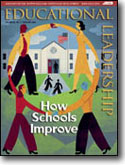Articles in this month's issue provide rich food for discussion about both the means and the ultimate goal of school improvement.
Uncovering Your Teaching Philosophy
David Ferrero (“Pathways to Reform: Start with Values,” p. 8) points out that great teachers enter the profession not on a mission to raise test scores, but “out of a deep sense of what's good for kids and society, what's worth knowing and thinking about.” Our individual views on what makes a good education are shaped by our “beliefs and values that create our sense of what makes life worth living, and therefore what is worth teaching and how we should teach it.” Ferrero claims that openly acknowledging our philosophical differences, and forging separate schools shaped around shared beliefs, will create more focused and potent learning communities.
- In your group, answer individually and discuss jointly the questions Ferrero poses: What motivated me to go into teaching? What do I think students should know and be able to do? Who has influenced my education philosophy?
- Consider inviting teachers and administrators in your school—and possibly even parents who are active in the school—to write answers to these questions anonymously. Do the results show that most people involved in the school embrace a common philosophy, or do people show different values and goals? What are the implications of the range of views for your school's growth and direction?
- Choose a book from the list Ferrero provides to read as a group—or have each group member read and sum up the philosophical ideas of one book. Ensuing discussions should help group members clarify their individual beliefs.
Private Partnerships: Boon or Bogeyman?
- Is it important that the people who live in the area of a school and who are affected by how learning is fostered there play a significant part in deciding how to structure that school and what curriculum to use in classrooms? Why or why not?
- Whittle says whether to turn to private companies “is simply a question of what public educators believe is the best strategy to improve achievement.” Who should be the “public educators” making this choice?
- What do you think of public schools and for-profit companies working in a “public/private” partnership to educate students? What are the implications for teachers as partners if they are directed what curriculum to use?
Catalyzing Teacher Leadership
Teacher leadership is essential to school improvement. Articles in this issue detail conditions that help such leadership emerge. Pete Hall (“A School Reclaims Itself,” p. 70), Georgea M. Langer and Amy Colton (“Looking at Student Work,” p. 22) and William Powell (“Using Observation to Improve Instruction,” p. 52) stress the need for shared teacher planning time. Barnett Berry, Dylan Johnson, and Diana Montgomery (“The Power of Teacher Leadership,” p. 56) describe how one low-income school cultivated National Board Certified teachers as school leaders.
- Do a mini-analysis of how often teachers truly plan together at your school. Providing log sheets, ask teachers to jot down over one month the “where, when, and who” each time they plan lessons or strategize for specific students with a colleague . Ask about what conditions in your school put up barriers to shared planning. At a teacher meeting (or a breakfast to reward those who participated) show your findings, and brainstorm ways to remove obstacles.
- Invite several National Board Certified teachers to share with your group their experiences in becoming certified and to display the portfolios of teacher work they developed. Did certification sharpen their leadership skills? How? What changes have they spearheaded in their school or area?

